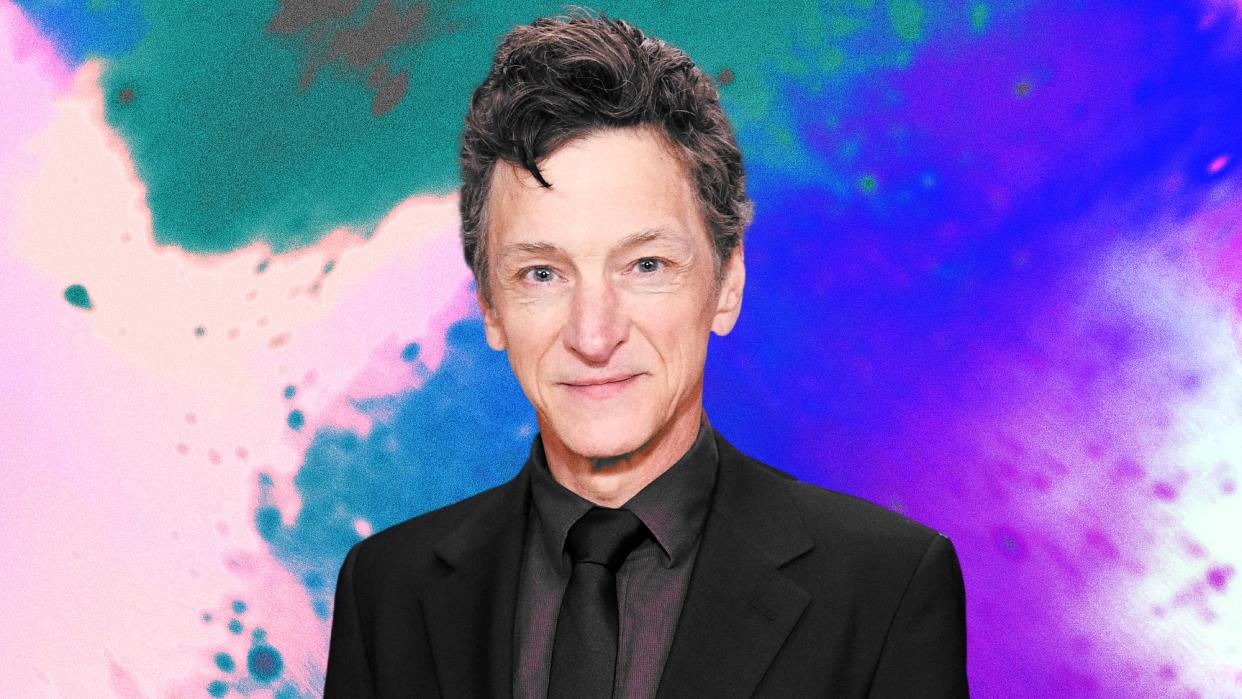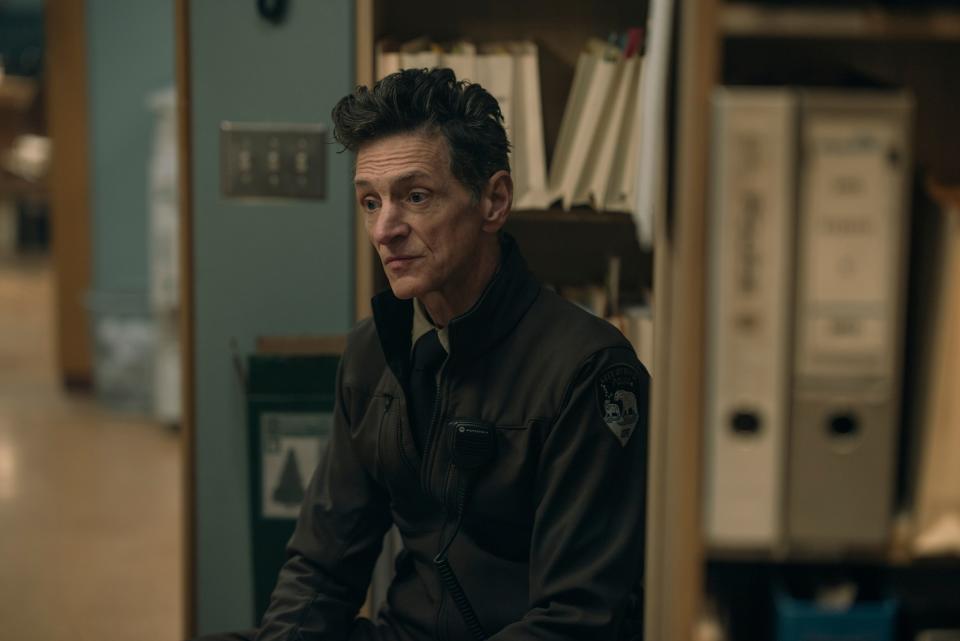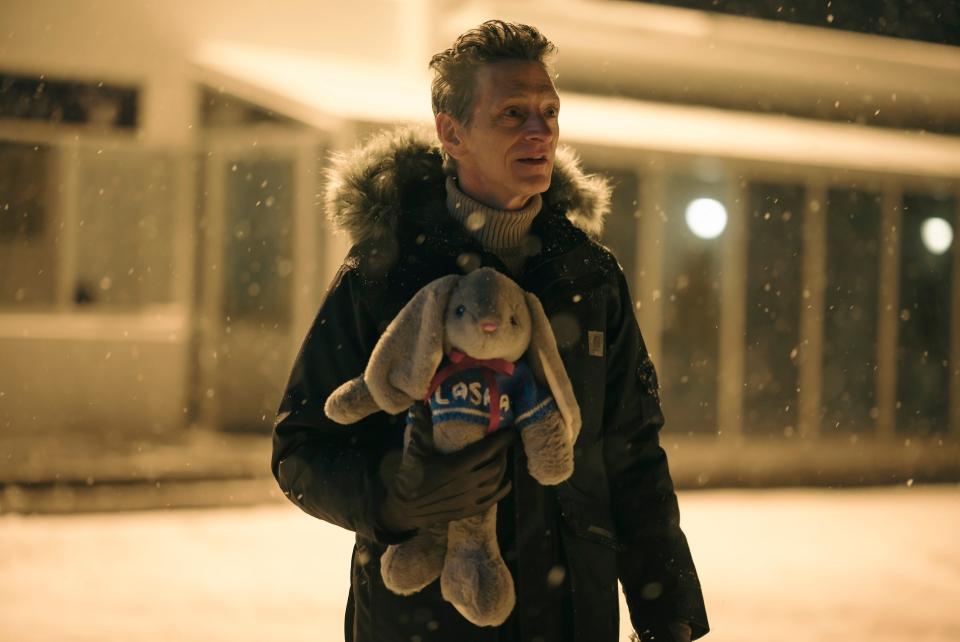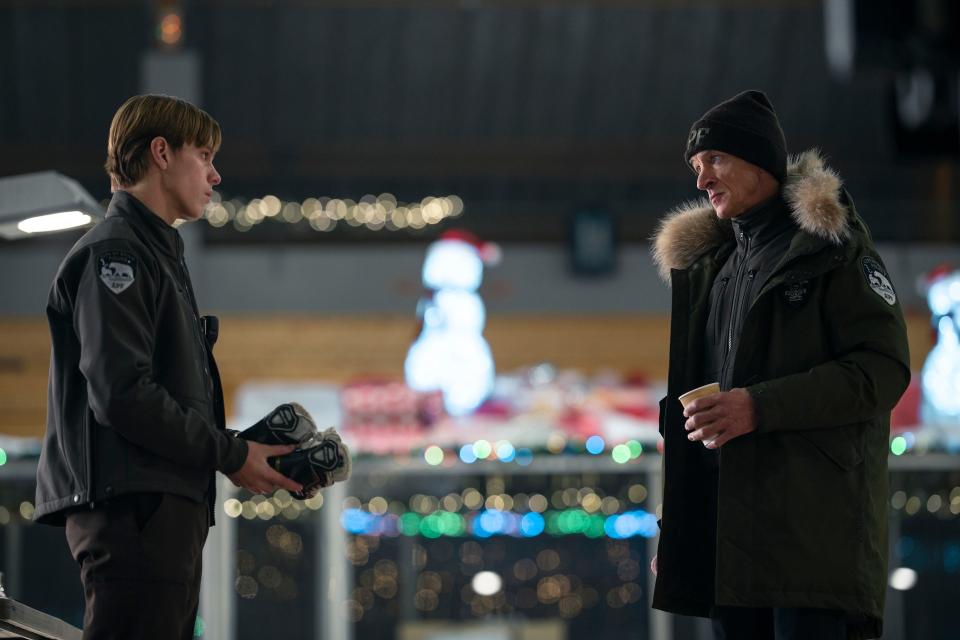True Detective: Night Country ’s John Hawkes Breaks Down His Shocking Episode

- Oops!Something went wrong.Please try again later.
- Oops!Something went wrong.Please try again later.
Photograph: Getty Images; Collage: Gabe Conte
This interview contains spoilers for True Detective: Night Country episode five.
John Hawkes is no stranger to playing shifty guys in bleak places (see Winter’s Bone, Three Billboards Outside Ebbing, Missouri). In True Detective: Night Country, the 64-year-old actor inhabits one of the shiftiest guys in one of the bleakest places: policeman Hank Prior in fictional Ennis, Alaska, during the long polar night. Hank has a strained relationship with his son, Peter (Finn Bennett), ends up catfished by his supposed Eastern European online girlfriend, and has, on multiple occasions, found himself operating on the wrong side of the law.
In episode five, he meets an abrupt, shocking end. Evangeline Navarro (Kali Reis) and Liz Danvers (Jodie Foster) are growing closer to solving the cold case murder of local Inupiat woman Annie K and the recent mysterious deaths of eight men at an Arctic research station. At the behest of the town’s mine owner, Kate McKittrick (Dervla Kirwan), Hank steps in to dispatch one of their remaining witnesses. Following a tense confrontation, Peter unexpectedly shoots and kills his father.
True Detective: Night Country was filmed in Iceland, but Hawkes is typically based in Los Angeles, where he spends most of his free time playing golf. “It's a game of constant failure and how you deal with that moment to moment. You play with a lot of strangers. You go up alone, and just suddenly you're out there with people you don't know and you learn about their lives. It's been really great for me,” he says. “And it's also incredibly cheap here. I play on municipal courses, so it's not a country club situation. Wear a T-shirt and do whatever you like.”
He also broke down his character’s episode-five demise, shared the story behind his original music for the show, and rhapsodized about staying extremely offline.

GQ: So how did True Detective come your way?
John Hawkes: Issa López was interested in me playing one of the parts. She and I began to speak via video chat. And I hadn't worked in a long time and wasn't sure I wanted to work, but I knew that I loved HBO, and Issa just seemed like a really smart, interesting human being. And so that was intriguing.
It took a couple of meetings before I accepted, mainly because I knew that it would be a very long shoot in a very dark, cold place, and playing a character that was going to be difficult to live in for a long time. But I watched Issa's film, Tigers Are Not Afraid, and that sealed the deal.
Were you a fan of the previous seasons at all?
I'm embarrassed to say that I haven't seen any of them. I should lie about that, but yeah, I don't watch a lot of stuff. I just really don't. I read a lot and watch a lot of nature programming.
Playing a tragic guy in a cold place is very much your specialty. That being said, how did you prepare to play Hank Prior? In a show when everyone’s very much carrying their past with them, what sort of backstory did you make up for him?
I'm an over-preparer by nature. I certainly made up a very extensive backstory for Hank, and part of that was done with Issa. I normally would do that kind of prep work alone, but because the Hank that I first read when I was offered the show, one of my concerns was…Issa is an incredible writer. But I just felt like he could be a lot more shaded and subtle and nuanced and more of a complex human being. And she agreed. And so we began to speak about that and I realized quickly that I would just muse about an idea sometimes to her, and the next draft of the script, that would be there.
What were certain things that were changed?
I mean, just the musical angle I was mistrustful of at first. When Issa suggested maybe Hank played the guitar, I just thought Hank would be a very different person if he had a creative outlet. I fought that early on, long before we'd even started shooting. But we thought, Well, maybe he was in a band before. And wouldn't that be interesting? Actors are fond of saying, "My character wouldn't do that." It's a real disservice to yourself and to those around you to say that.
Your character meets a dramatic end in this episode. What did you think when you first encountered his death in the script?
It was a very different scene. It was the problem scene out of the five episodes that I was in, and Issa agreed. We met—Jodie and Kali Reis and Isabella Star LaBlanc and Finn Bennett and I. We had a couple of weeks to have all-day meetings where we would read the episodes, discuss, rewrite together. We rewrote that scene piece by piece to try to make it more believable, more subtle, and just more in service to the story as a whole.
Was Hank not going to die originally, or die in a different way?
The strokes were much broader originally. And there were things that strained credibility. So it was all about making it believable. Even up until we were shooting—I came in to shoot on that day and an idea had come up about how if Jodie's somehow unarmed, it can all work. If she's got a weapon on her, it's probably not going to work. So the idea that she takes her sidearm off and lays it on a table, and then I pick up that weapon—that was something that was decided at the last moment.
The previous episode is also pretty devastating, when he's waiting for his online girlfriend to show up on the plane. And she obviously doesn't. Do you feel like he knew deep down that he was getting scammed and chose to ignore it, or was he fully catfished?
I think that there's often a part of us that doesn't want to believe what's right in front of our eyes. And I think we can be really good at that as human beings—particularly as lonely, desperate, sad human beings. The way that I'd written the backstory was that she was going to come at Thanksgiving and then couldn’t because her mother was ill. And so I sent her more money, and everything was set up, and she doesn't come. But when I first read it, I thought she arrived and I was thinking, I know a really great Polish actress who would be cool for the role.

Oh, man. You brought up Hank’s musical background—what's the song you're singing and playing on the guitar earlier in this episode? I was googling the lyrics and couldn't find anything.
I just love that there's something that's not on the internet. I love that there's still some mystery left in the world. Once I'd agreed that, yeah, Hank can play music, I wrote the instrumental and sent it to Issa before we'd even arrived in Reykjavik to begin shooting. And then I played a show in Iceland and Issa came and saw the show, and afterwards said, "I think Hank has to sing. I think that there has to be lyrics."
Up until the last minute, I was still fighting and thinking I was winning and that there wouldn't be lyrics. But Issa's so brilliant, and I just had to really trust her idea that it can be okay for a guy to sit there and sing and it doesn't seem so much like a performance out of nowhere in the middle of the show. So I wrote some words last minute. That's an original song called “No Use” that I wrote and sang for the show.
Nice. A John Hawkes original. The other thing about Hank is that he doesn’t seem like a bad guy. But near the end, he really slides off. What motivates him to collaborate with the mine owner and to have moved Annie K’s body?
Greed comes to mind. Hank was a cop who was really doing things his own way, which would make sense in a small town. You treat this person this way, this person that way. Not everyone's equal in his eyes, exactly. And so he was probably turning a blind eye towards certain behaviors. Certainly [mine owner] Kate McKittrick would know about that. So already she's got a little something on him.
What motivates him to carry out the task of cutting out Annie's tongue, it wasn’t something he took pride in but needed to be done to send the message. I think the quid pro quo was, you'll become chief of police if you do this for me. Then once he's done it and he doesn't become chief of police, she's got that on him too now. Obviously, much worse than just turning a blind eye toward a DUI or something like that. I think it's motivated by his career aspirations, ultimately, and hopefully that his son might view him in a more favorable light as someone who's gotten to the top of his profession, but it never happens.
You grew up in Minnesota, right?
I did. Yes.
How prepared were you for the Icelandic winter cold?
I left Minnesota when I was 19 years old. So I haven't lived there in many years, and my blood has thinned in trips back for the holidays over the years. The first thing I would think getting off the plane is, "Who would do this? Why would anyone live in this brutal cold?" So yeah, I lost a lot of my Minnesota edge. But I got it back, I think, in Iceland. Iceland has a warmer winter than Minnesota by quite a bit, but Minnesota's not quite as dark so long.
What was your best memory from filming out there?
Oh, man, I think the people. I got to play music. I got to record with some really great Icelandic producers and just really had a blast. But I think even more so was Issa and Jodie and Finn and the whole gang. And the Icelanders as well that I got to know and whose friendships I'll treasure the rest of the way.

You’re one of our great character actors. Which role do you get recognized for the most?
Maybe Deadwood, just because it was on for a really long time and because it had an unsatisfying ending. It was a thing that 8, 9, 10 years later—before we made the movie—people I didn't know would say, "Hey. You were so great on this show, Deadwood, and the show was so great. And is there ever going to be any more?" And the answer was always, "I wish, but I don't think so."
One last thing: I was told that you don’t own a computer. Teach me your ways.
Well, I just didn't join up. I do have a computer, but I was on a computer in 1976, and the next time I was on a computer was maybe 2012. So I have a computer. I didn't have email until COVID. Didn't have a smartphone until COVID, but I needed to get food and my computer was breaking. And my flip phone, I wasn't really able to order things I needed. I've never been on Amazon to this day. I mean, I have running water and electricity. I have all the modern amenities. The more time I look at a screen, the less happy I feel.
Originally Appeared on GQ
More Great Stories from GQ
Cillian Murphy Is the Man of the Moment
You Don’t Need To Lift Heavy Weights To Build Bigger Muscles
Killer Mike Talks About His Big Grammy Night: Three Wins, One Arrest, and a Long Talk With God
Ben Affleck Has Fully Adopted the Sneakerhead Uniform
Not a subscriber? Join GQ to receive full access to GQ.com.

